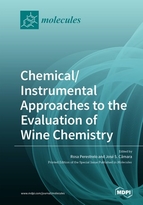Chemical/Instrumental Approaches to the Evaluation of Wine Chemistry
A special issue of Molecules (ISSN 1420-3049). This special issue belongs to the section "Analytical Chemistry".
Deadline for manuscript submissions: closed (30 November 2019) | Viewed by 40884
Special Issue Editors
Interests: analytical chemistry; metabolomics and volatilomics; green extraction technologies; valorization of agro-food by-products; bioactive compounds and functional foods
Special Issues, Collections and Topics in MDPI journals
Interests: chemical characterization of foods and food-related matrices; natural products; food bioactive components; food contaminants; authenticity and typicality of foods; food chemistry; analytical chemistry
Special Issues, Collections and Topics in MDPI journals
Special Issue Information
Dear Colleagues,
Wine is a widely consumed beverage thanks to its unique and pleasant sensory properties. Wine is composed of more than one thousand chemical compounds (e.g., alcohols, esters, acids, terpenoids, phenolic compounds, flavonoids, anthocyanins, minerals, vitamins, among others) resulting from several chemical and biochemical processes. Nowadays, microextraction techniques in tandem with high-resolution analytical instruments have been applied by wine researchers to expand the knowledge of wine´s chemical composition with the purpose to improve wine quality, support winemaker decisions related to the winemaking process, and guarantee the authenticity and genuineness of wine.
This Special Issue aims to update the top-of-the-art extraction procedures (e.g., -SPEed, MEPS, NTME, SPME) and analytical methodologies (e.g. HRMS, NMR, electrophoresis) emphasizing their use as suitable platforms for the establishment of the chemical composition of wine (volatomic profile, antioxidants, phenolic pattern, elemental composition, among others). In addition, information related to wine sensorial properties, contaminants, authenticity, and chemometric tools used for data treatment will be described in this issue.
Dr. Perestrelo Rosa
Prof. Dr. José Sousa Câmara
Guest Editors
Manuscript Submission Information
Manuscripts should be submitted online at www.mdpi.com by registering and logging in to this website. Once you are registered, click here to go to the submission form. Manuscripts can be submitted until the deadline. All submissions that pass pre-check are peer-reviewed. Accepted papers will be published continuously in the journal (as soon as accepted) and will be listed together on the special issue website. Research articles, review articles as well as short communications are invited. For planned papers, a title and short abstract (about 100 words) can be sent to the Editorial Office for announcement on this website.
Submitted manuscripts should not have been published previously, nor be under consideration for publication elsewhere (except conference proceedings papers). All manuscripts are thoroughly refereed through a single-blind peer-review process. A guide for authors and other relevant information for submission of manuscripts is available on the Instructions for Authors page. Molecules is an international peer-reviewed open access semimonthly journal published by MDPI.
Please visit the Instructions for Authors page before submitting a manuscript. The Article Processing Charge (APC) for publication in this open access journal is 2700 CHF (Swiss Francs). Submitted papers should be well formatted and use good English. Authors may use MDPI's English editing service prior to publication or during author revisions.
Keywords
- volatile profile
- phenolic profile
- elemental composition
- contaminants
- sensorial analysis
- off-flavors
- quality control
- authenticity markers
- microextraction procedures
- analytical instruments
- chemometric tools
Benefits of Publishing in a Special Issue
- Ease of navigation: Grouping papers by topic helps scholars navigate broad scope journals more efficiently.
- Greater discoverability: Special Issues support the reach and impact of scientific research. Articles in Special Issues are more discoverable and cited more frequently.
- Expansion of research network: Special Issues facilitate connections among authors, fostering scientific collaborations.
- External promotion: Articles in Special Issues are often promoted through the journal's social media, increasing their visibility.
- Reprint: MDPI Books provides the opportunity to republish successful Special Issues in book format, both online and in print.
Further information on MDPI's Special Issue policies can be found here.








